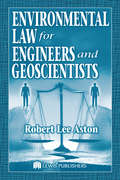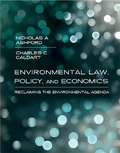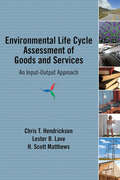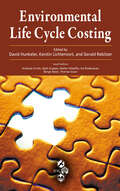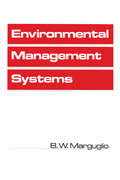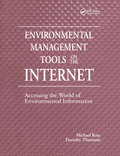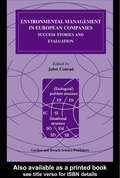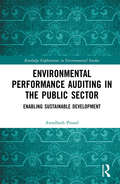- Table View
- List View
Environmental Law for Biologists
by Tristan KimbrellEnvironmental law has an unquestionable effect on the species, ecosystems, and landscapes that biologists study--and vice-versa, as the research of these biologists frequently informs policy. But because many scientists receive little or no legal training, we know relatively little about the precise ways that laws affect biological systems--and, consequently, about how best to improve these laws and better protect our natural resources. With Environmental Law for Biologists, ecologist and lawyer Tristan Kimbrell bridges this gap in legal knowledge. Complete with a concise introduction to environmental law and an appendix describing the most important federal and international statutes and treaties discussed, the book is divided into four broad parts: laws that focus on individual species, like invasive species policies, the Endangered Species Act, and international treaties such as CITES; laws that focus on land, from federal public lands to agricultural regulations and urban planning; laws that focus on water, such as the Clean Water Act; and laws that focus on air, such as the Clean Air Act and international measures meant to mitigate global climate change. Written for working biologists and students alike, this book will be a catalyst for both more effective policy and enhanced research, offering hope for the manifold frictions between science and the law.
Environmental Law for Engineers and Geoscientists
by Robert Lee AstonToday’s engineering and geoscience student needs to know more than how to design a new or remedial project or facility. Questions of law and ambiguities of terms often occur in contracts for mining, landfills, site reclamation, waste depositories, clean up sites, land leases, operating agreements, joint ventures, and other projects. Work place situations arise where environmental compliance methods are challenged by enforcement agencies. Although the statutes, rules, and regulations may seem to be worded clearly and specifically, there are often questions in application and sometimes varied interpretations. Environmental Law for Engineers and Geoscientists introduces simplified American jurisprudence focusing on the legal system, its courts, terms, phrases, administrative law, and regulation by the agencies that administer environmental law. The book comprehensively covers the “big five” environmental statutes: NEPA, CAA, CWA, CERCLA, and RCRA. With the basic law chapter as a foundation, the book covers the practical applications of environmental law for geo-engineers. It concludes with a chapter on the growing area of expert witnessing and admissible evidence in environmental litigation — an area of law where success or failure increasingly depends on the exacting preparation and presentation of expert scientific evidence. Written by a professional mining and geological engineer and a practicing attorney, Environmental Law for Engineers and Geoscientists prepares students for the numerous environmental regulatory encounters they can expect when dealing with various statutes, laws, regulations, and agency rules that govern, affect, and apply to environmental engineering projects. It provides a working knowledge of how to judge whether or not a project is in compliance with regulations, and how to ensure that it is.
Environmental Law for The Built Environment
by Jack RostronThis book provides a concise exposition of the relevant law and techniques commonly used to meet the regulatory requirements concerning the built environment. It provides a much needed reference and learning text for the growing professional and student involved in the subject. Aspects of environmental law and technology covered include the administration and sources of law,town and country planning, water and air pollution, waste, integrated pollution control and the natural environment. It highlights the importance of cross-boundary control, describing in detail the European and international law and enforcement regimes, the agencies involved in town and country planning, procedures at inquiries and enforcement measures, as well as looking at future developments. The important new protocol for assessing the environmental impact of developments is explained in detail. The policy framework and technical processes involved in dealing with water pollution are explored in terms of abstraction, supply, discharge and classification. Air pollution is dealt with in terms of energy efficiency, nuclear power, transport and future potential developments, and the recent phenomenon of sick building syndrome is explored in some detail. Other areas covered include the regulatory and technical processes involved in dealing with contaminated land, recycling/re-use, incineration, import/export and the law, policy and technology of integrated pollution control. A detailed exposition is offered of the legal issues concerning protection of the countryside, birds and animals; the problem of genetically modified crops; forestry; and mining.
Environmental Law, Policy, and Economics: Reclaiming the Environmental Agenda
by Charles C. Caldart Nicholas A. AshfordTraces important legal, economic, and scientific developments in the environmental field through an examination of environmental law cases and commentaries by leading scholars, focusing on pollution prevention and control and emphasizing the evaluation, design, and use of the law to stimulate technological change and industrial transformation.
Environmental Law: International and Regional African Perspectives on Law and Management
by Emmanuel OnyeaborThis book offers an overview of environmental law from both an international and regional perspective, focusing on global issues while at the same time offering uniquely African insights. The book addresses environmental issues, principles, and policies from the standpoints of law and management. There is a growing need for books on environmental law that integrate environmental issues, principles and policies in a single source to guide practitioners in the fields of environmental studies and environmental law. This book covers the corresponding principles, theories, procedural rights, international and regional strategies, liabilities and remedies for environmental damage, including in/to the marine environment. Topics addressed include atmospheric pollution, water pollution, marine pollution, land use, and waste management. Given its scope, the book will be of interest to practitioners in the fields of environmental studies and environmental law, corporations, policymakers, judges, students, and all others who are concerned with environmental issues, principles, policies and the law.
Environmental Liability and the Interplay between EU Law and International Law (Routledge Research in International Environmental Law)
by Emanuela OrlandoThe role of law in responding to global environmental problems and the interplay between different levels of regulation and governance is becoming increasingly relevant in the field of liability and reparation for environmental damage. This book examines the relationship and reciprocal influences between the EU and the international legal order in a multilevel and comparative perspective, in relation to the ongoing efforts to elaborate effective regimes of liability and reparation for environmental damage. It offers a comparative analysis of legal developments in the field of environmental liability within the EU and at the international law level and addresses questions concerning the impact of such interaction on the development, implementation and enforcement of appropriate responses to environmental damage within the respective legal orders and on a global level. Given the book’s focus and the transnational legal dimension of the issues covered, this volume will be of great interest to legal academics and researchers working in the environmental law field from an EU law and international law perspective, as well as more generally to scholars interested in the study of the relationship between EU and international law. Outside academia, the book will also be of great interest to practitioners wishing to get insights into the application of the law of environmental liability in the EU and at the international law level.
Environmental Life Cycle Assessment of Goods and Services: An Input-Output Approach
by Chris T. Hendrickson Lester B. Lave H. Scott MatthewsEnvironmental life cycle assessment is often thought of as cradle to grave and therefore as the most complete accounting of the environmental costs and benefits of a product or service. However, as anyone who has done an environmental life cycle assessment knows, existing tools have many problems: data is difficult to assemble and life cycle studies take months of effort. A truly comprehensive analysis is prohibitive, so analysts are often forced to simply ignore many facets of life cycle impacts. But the focus on one aspect of a product or service can result in misleading indications if that aspect is benign while other aspects pollute or are otherwise unsustainable. This book summarizes the EIO-LCA method, explains its use in relation to other life cycle assessment models, and provides sample applications and extensions of the model into novel areas. A final chapter explains the free, easy-to-use software tool available on a companion website. (www.eiolca.net) The software tool provides a wealth of data, summarizing the current U.S. economy in 500 sectors with information on energy and materials use, pollution and greenhouse gas discharges, and other attributes like associated occupational deaths and injuries. The joint project of twelve faculty members and over 20 students working together over the past ten years at the Green Design Institute of Carnegie Mellon University, the EIO-LCA has been applied to a wide range of products and services. It will prove useful for research, industry, and in economics, engineering, or interdisciplinary classes in green design.
Environmental Life Cycle Costing
by David Hunkeler Kerstin Lichtenvort Gerald RebitzerBalances Scientific and Economic Points of View to Thoroughly Address Management IssuesResponding to the need for clarification and benchmarks, Environmental Life Cycle Costing provides the fundamental basis on which to establish a definitive methodology. Clearly defining environmental LCC, this book balances scientific and econom
Environmental Litigation in China
by Rachel E. SternThis is a book about the improbable: seeking legal relief for pollution in contemporary China. In a country known for tight political control and ineffectual courts, Environmental Litigation in China unravels how everyday justice works: how judges make decisions, why lawyers take cases, and how international influence matters. It is a readable account of how the leadership's mixed signals and political ambivalence play out on the ground - propelling some, such as the village doctor who fought a chemical plant for more than a decade, even as others back away from risk. Yet this remarkable book shows that even in a country where expectations would be that law wouldn't much matter, environmental litigation provides a sliver of space for legal professionals to explore new roles and, in so doing, probe the boundary of what is politically possible.
Environmental Management System ISO 14001: Handbook of Transition with CD-ROM
by Syed HaiderEnvironmental Management System ISO 14001:2004 provides the information and practical know-how required to facilitate a smooth adoption and incorporation of the latest revisions and enhancements put forth by the International Organization for Standardization. This unique work shows how to adopt or transition to the documentation procedures required
Environmental Management Systems
by B. MarguglioThis book discusses the features of the environmental policies and procedures that should exist at the plant level and thus helps utility, petrochemical, chemical, pharmaceutical, and other manufacturing industries benefit technically and economically by implementing these feature.
Environmental Management Tools on the Internet: Accessing the World of Environmental Information
by Michael KatzThis book provides general information about what is on the Internet and how to access it. It shows how o get environmental information off of the Internet. The book covers the database services that are available on the Internet that charge fees.
Environmental Management in China: Policies and Institutions
by Jing Wu I-Shin ChangThis book details various stages in the introduction, establishment and evolution of China’s environmental management system. By combining a literature review, comparative analysis, and case study, it investigates the environmental management system in several key periods in order to systematically assess the necessary measures and appropriate adjustments the Chinese Government implemented to reconcile the growing conflicts between economic development and resources conservation, in the context of rapid economic growth and economic transformation. Given its scope, the book offers a valuable resource for experts, scholars, and government officials in related fields.
Environmental Management in European Companies: Success Stories and Evaluation
by Jobst ConradOver the past decade, the greening of industry has become both an issue in scientific and political debate and a generic substantive development in industry itself. This study is the product of an international collaborative research project investigating exemplary cases of successful environmental management in European companies in Denmark, Germa
Environmental Management in Organizations: The IEMA Handbook
by John Brady Alison Ebbage Ruth LunnEnvironmental issues can present some daunting operational concerns for all types of organization, whether in the private, public and voluntary sectors. Managing them requires environmental professionals with a working knowledge of the rapidly developing body of regulatory measures. This new edition of Environmental Management in Organizations provides all the management tools, performance measures and communication strategies that organizations need to manage their environmental responsibilities effectively. Leading experts on each topic provide focused explanations and clear practical guidance, as well as setting out the context and the key environmental and management drivers. This edition significantly updates the original handbook to take account of developments in the environmental agenda, including new dedicated chapters on climate change, energy, transport, biodiversity and chemicals. Published with IEMA.
Environmental Management in Ski Areas: Procedure - Requirements - Exemplary Solutions (SpringerBriefs in Environmental Science)
by Ulrike Pröbstl-Haider Monika Brom Claudia Dorsch Alexandra Jiricka-PürrerThis book raises awareness of environmentally friendly and resource-sparing management of winter sports areas, in order to increase the number of certified ski areas. Many ski areas today are advertised with seals of approval, titles and awards. Often, however, it is unclear which institutions and criteria are behind these appraisals. This practice is widely criticized as “green-washing”, since a cautious use of ecologically and scenically sensitive mountain areas is more important now than ever. An environmental management system based on international or European standards ensures “real” improvements and external evaluation, but relies on the personal responsibility of the providers rather than on regulations imposed by authorities. This book contributes to developing a trustworthy and unified system for such evaluation, and one that can be applied internationally.
Environmental Management of Marine Ecosystems (Applied Ecology and Environmental Management)
by Md. Nazrul Islam and Sven Erik JørgensenEcosystem-Based Management (EBM) is one of the most holistic approaches to protecting marine and coastal ecosystems as it recognizes the need to protect entire marine ecosystems instead of individual species. After decades of pollution, habitat degradation and overfishing, now climate change and ocean acidification threaten the health of the ocean in unprecedented way. Environmental Management of Marine Ecosystems illustrates the current status, trends, and effects of climate, natural disturbances and anthropogenic impacts on marine ecosystems. It demonstrates how to integrate different management tools and models in an up-to-date, multidisciplinary approach to environmental management. This indispensable guide provides several case studies from around the world and creates a framework for identifying management tools and their applications in coral reefs, fisheries, migratory species, marine islands and associated ecosystems such as mangroves and sea grass beds. It discusses the physical and chemical compositions of marine ecosystems along with the threats and actions needed to protect them. The application of model framework to several contemporary management issues include the modelling of harmful algal bloom dynamics, understanding the dispersal of sea lice, and the possible impacts on intertidal communities of the provision of novel offshore habitat. The results of extensive research by an international team of contributors, the Environmental Management of Marine Ecosystems is designed to inform scientists, practitioners, academics, government and non-government policymakers on the particularities of marine ecosystems and assist them in understanding the EBM approaches in means of mitigation and adaptation of human activities that result in sustainability. These practices will help change the current methodologies used for resource assessment and the future regulations of marine resources.
Environmental Management: Environmental Issues, Awareness and Abatement
by Basharat Mushtaq Suhaib A. Bandh Sana ShafiIn the current age of science and technology, our lives have become dominated by countless scientific and technological innovations without which the earth would be a much poorer place. Life as we know would become absolutely bleak and boring without the inventions and advances being made all over the globe. In fact, scientific inventions, discoveries and innovations have ushered in a dramatic revolution in virtually every sphere of life. But at the same time, the skewed use of technology is at loggerheads with the environment. We, and our environment, now face a number of critical challenges and it is in response to this that we wrote this book to raise awareness for environmental issues and related management aspects. With a primary focus on Environmental Management – the rational reconciliation of man and nature, which involves the judicious exploitation and utilization of natural resources without disturbing the ecosystem’s balance – it will thus help to improve the relationship between man and environment. Moreover, it offers a wealth of ready-to-use material for advanced undergraduate and graduate students of Environment and Water Management. The book systematically addresses a range of key aspects, e.g. scientific principles, methods and ideas, as well as life-long learning skills for students. Further, it provides a solid foundation for applying scientific approaches to environmental problems.
Environmental Management: Problems and Solutions
by Louis Theodore R. Ryan Dupont Terry E. BaxterThere is a growing need to support undergraduate educators in the development of environmental management educational materials. Recognizing this need, the National Science Foundation funded a College Faculty Workshop on Environmental Management, that was conducted at Utah State University in July and August 1996. The principle objectives of the seminar were (1) to provide a meaningful course which would generate new ideas and innovative educational approaches in the emerging field of environmental management, and (2) to develop an applications-oriented problem workbook which would support undergraduate faculty involvement in the production of course materials. The result of this effort is Environmental Management: Problems and Solutions, an informative text on the essentials of environmental management.More than 200 structured problems presented in the book are meant to elicit a sound understanding of the basics of environmental monitoring, assessment and control. Detailed solutions to each problem, provided with each chapter, will prove useful to both the student and the instructor.This innovative text is a valuable resource for anyone involved in training of engineers and scientists in the field of environmental engineering.
Environmental Markets
by Terry L. Anderson Gary D. LibecapEnvironmental Markets explains the prospects of using markets to improve environmental quality and resource conservation. No other book focuses on a property rights approach using environmental markets to solve environmental problems. This book compares standard approaches to these problems using governmental management, regulation, taxation, and subsidization with a market-based property rights approach. This approach is applied to land, water, wildlife, fisheries, and air and is compared to governmental solutions. The book concludes by discussing tougher environmental problems such as ocean fisheries and the global atmosphere, emphasizing that neither governmental nor market solutions are a panacea.
Environmental Mediation: An International Survey (Routledge Research in International Environmental Law)
by Catherine Choquette Véronique FraserEnvironmental mediation continues to develop and evolve in different jurisdictions across the world in order to prevent potential environmental conflicts or to resolve the conflicts while avoiding the inherent drawbacks of an adjudicated solution. This book takes a comparative approach to explore the legal framework of environmental mediation with a focus on the judicial, administrative and private procedures and the criteria for accrediting mediators in a range of jurisdictions across the world. It also examines practical considerations for environmental mediators while analysing the effectiveness of different mediation processes.
Environmental Noise Control: The Indian Perspective in an International Context
by Naveen GargThis book provides a concise and up-to-date overview of environmental noise control issues, utilizing specific case studies from India to help explore noise mapping and monitoring, impact analysis, and policy, among other relevant topics. The book provides an extensive review of recent studies, including references, and describes the latest noise monitoring structures. It also addresses heretofore under-emphasized topics, including but not limited to acoustic metrology, Multi Attribute Decision Making (MADM) techniques, and sound insulation utilizing passive control strategies.
Environmental Performance Auditing in the Public Sector: Enabling Sustainable Development (Routledge Explorations in Environmental Studies)
by Awadhesh PrasadEnvironment and sustainable development challenges are a matter of global concern. Trillions of dollars of mostly public money are invested every year in domestic and international policies and programs to address these challenges. The effectiveness of these policies and programs is critical to environmental sustainability. Performance audits that examine the effectiveness of governmental policies and programs heavily influence their implementation. Despite this, performance auditing in the environment field has received very little academic attention. This book takes a closer look at performance auditing of public sector environmental policies and programs. It examines trends in global environmental performance auditing; and how it is currently practiced drawing on a global survey and case studies from Canada, India and Australia. In doing so, it identifies issues and challenges faced by Supreme Audit Institutions in undertaking these performance audits. This book will be of interest to students, scholars and practitioners of sustainable development, environmental auditing and public sector auditing as well as to donor organisations engaged in these areas.
Environmental Personhood: New Trajectories in Law (New Trajectories in Law)
by Francine RochfordThis book examines the increasingly widespread movement to recognise the environment as a legal person. Several countries have now recognized that nature, or parts of nature, have juristic personhood. In this book, the concept of legal personhood and its incidents are interrogated with a view to determining whether this is, or could be, a positive contribution to modern environmental problems. Surveying historical and current positions on the juristic concept of legal personhood, the book engages recent legislation and case law, in order to consider the attempt in several countries to vest personhood in rivers, river basins and ecosystems. Comparing approaches in a range of countries – including New Zealand, India, Ecuador, the United States and Australia, it addresses the methods employed, the purported aims, the mechanisms for enforcement, and the entrenchment of legal protections. Throughout, the book elicits the difficult relationship between an historically anthropocentric idea of personhood and its extension beyond the human; concluding that the attribution of personhood to the environment is an important, but limited, contribution to environmental sustainability. Accessibly written, this book will appeal to scholars, students and others with interests in environmental law, environmental science and public policy, and ecology more generally.
Environmental Perspectives
by Neil ShifrinThis short, readable book is intended as a big-picture introduction/overview for environmental students and lay-people involved with environmental issues. Every freshman in college intending to study environmental science should read it. It begins with a historical perspective on waste and environmental control. Basic instruction on some important fundamentals faced by environmental professionals every day, such as sampling, analysis, data visualization, risk assessment and forensic chemistry are provided in the following chapter. Important regulatory fundamentals, such as the National Contingency Plan, which is the U. S. regulatory framework for addressing hazardous waste is also defined. The book concludes with pertinent and provocative considerations on the future of environmental management, such as alternative approaches (technical impracticability), the "not-in-my-backyard syndrome," and the safety of chemicals in consumer products. The book contains many useful facts about waste production rates, energy use and recycling rates--all referenced to allow substantiation and provide a springboard for further research.

